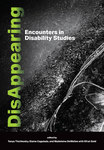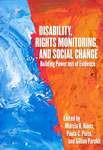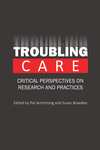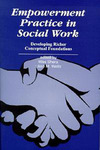We don’t actively support Internet Explorer
It appears that you are using Internet Explorer, which has been discontinued by Microsoft. Support has ended for versions older than 11, and as a result you may face security issues and other problems when using it.
We recommend upgrading to a newer browser such as Firefox, Google Chrome, or Edge for a much better experience across the web.
While this site may work with Explorer, we are not testing and verifying it, so you may run into some trouble or strange looking things.
Overview
Rethinking Normalcy introduces the growing field of disability studies to an undergraduate audience in a variety of disciplines and programs based in the social sciences, humanities, and health sciences. The authors articulate the depth and breadth of this newly emerging field of study and provide a vibrant foretaste of the kind of work disability studies scholars and activists do to provocatively question the power of normalcy.
Strongly interdisciplinary, this volume draws upon many different social and cultural approaches to address disability as a social and political construction. Diverse chapters unite theoretical perspectives and personal accounts to critically analyze notions of disability as a personal tragedy, an abnormality, or an individual matter. Topics addressed in this reader include a review of the discipline, the normalization of suffering, institutionalization, law and policy, education and work, and issues of race, class, gender, sexuality, and nationality.
Features
- the chapters exemplify ways of questioning our collective relations to normalcy, as such relations affect the lives of both disabled and currently non-disabled people
- over sixty per cent of this book features the work of disability studies scholars located in Canada
Table of Contents
Foreword by Geoffrey Reaume
Preface
Introduction
Part I: Disability Studies and the Question of Normalcy
Chapter 1: The Social Model in Context, Michael Oliver
Chapter 2: Disability History: Why We Need Another "Other," Catherine J. Kudlick
Chapter 3: Disability Studies: The Old and the New, Tanya Titchkosky
Chapter 4: Disability, Identity, and Representation: An Introduction, Rosemarie Garland-Thomson
Chapter 5: "Difference in Itself": Validating Disabled People's Lived Experience, James Overboe
Part II: Normalizing Suffering
Chapter 6: Coming Face-to-Face with Suffering, Rod Michalko
Chapter 7: When the Body Protests: New Versions of Activism, Diane Driedger
Chapter 8: To Be or Not to Be? Whose Question Is It, Anyway? Two Women with Disabilities Discuss the Right to Assisted Suicide, Tanis Doe and Barbara Ladouceur
Part III: Institutionalizing Normalcy
Chapter 9: Conspicuous Contribution and American Cultural Dilemmas: Telethon Rituals of Cleansing and Renewal, Paul K. Longmore
Chapter 10: Patients at Work: Insane Asylum Inmates' Labour in Ontario, 1841-1900, Geoffrey Reaume
Chapter 11: Discipline and Dehumanization in a Total Institution: Institutional Survivors' Descriptions of Time-out Rooms, Claudia Malacrida
Part IV: Law and Social Space
Chapter 12: Bending towards Justice, Marcia H. Rioux
Chapter 13: Legal Peripheries: Struggles over DisAbled Canadians' Places in Law, Society and Space, Vera Chouinard
Part V: Education, Technology, and Work
Chapter 14: Visible Minorities: Deaf, Blind, and Special Needs Adult Native Literacy Access, Charles Miller
Chapter 15: Negotiating Identities, Negotiating Environments: An Interpretation of the Experiences of Students with Disabilities, Jacqueline Low
Chapter 16: The Normality of Doing Things Differently: Bodies, Spaces, and Disability Geography, Nancy Hansen and Chris Philo
Chapter 17: Disability, Marginality, and the Nation-State—Negotiating Social Markers of Difference: Fahimeh's Story, Parin Dossa
Part VI: Global Interconnections and Local Challenges
Chapter 18: The Sexist Inheritance of the Disability Movement, Corbett Joan O'Toole
Chapter 19: Disabled Women: An Excluded Agenda of Indian Feminism, Anita Ghai
Chapter 20: We Were Never Identified: Feminism, Queer Theory, and a Disabled World, Robert McRuer
Chapter 21: Creating Community across Disability and Difference, Carla Rice, Hilde Zitzelsberger, Wendy Porch, and Esther Ignagni
Appendix: Students' Resources: Further Readings and Related Websites









